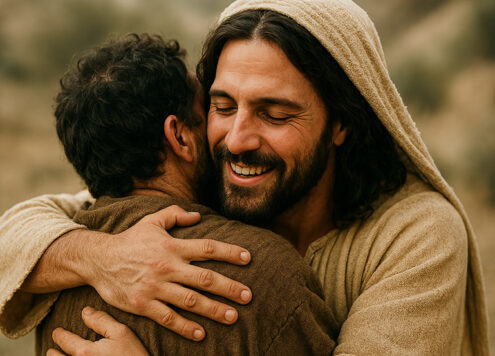In a world where self-promotion is the norm and personal gain is the goal, the concept of self-denial might seem as outdated as a rotary phone. Yet, as followers of Christ, we are called to a radical love that turns the world’s wisdom on its head. Welcome to a journey into the heart of Christian discipleship—a path that leads through the narrow gate of self-denial into the wide expanse of God’s love.
Imagine a boat adrift a tumultuous sea. You are the boat, and the world is a tumultuous sea. This worldly sea is buffeted by waves of materialism, individualism, and instant gratification. The challenge is to navigate your boat through these stormy waters. The temptation is to give into self-interest, promising safe harbor in the accumulation of wealth, status, and pleasure. But you know better, don’t you? If you look to self-interest you will find in the long run, as C. S. Lewis said, “only hatred, loneliness, despair, rage, ruin, and decay.” But look to Christ, and you will find peace and joy and everything else thrown in.
Jesus, the master of paradox, turns our worldly understanding upside down with His invitation: “Whoever wishes to come after me must deny himself, take up his cross, ad follow me. (Mark 8: 34). These words, echoing across centuries, challenge the condition of human heart. It’s a call to look deep within. Make no mistake about it—this is not a call to mere asceticism, stoicism or joyless deprivation. No, this is an invitation to the most profound freedom imaginable.
Consider the caterpillar, content with its earthbound existence until the moment it surrenders to the cocoon. In that dark place of seeming confinement, a miracle occurs. What emerges is not just a better caterpillar, but a creature transformed—a butterfly soaring on wings of beauty and grace. So, it is with you. When you embrace self-denial, you’re not losing your identity; you’re discovering your true self in a new way. You’re breaking free from the chrysalis of self-interest to become a new creation, transformed by the good news of the gospel.
At its core, self-denial is about gaining something, not giving up something. It’s about making room in our hearts for a love so vast, so transformative, that it can only come from God Himself. Think of a mother cradling her newborn, forsaking sleep to tend to her child’s needs. Is she diminished by this self-denial? No! She is enlarged by it, participating in a love that reflects the love of God.
In the grand history of salvation, we see the ultimate act of self-denial in Christ Himself. The Son of God, who could perform miracles by raising the dead, chose the path of humility and service. This divine self-emptying is our model. It shows us that true greatness lies not in exalting oneself, but in denying oneself.
So how do you live this out in your daily life? It starts with small things. Choosing patience when frustration rises, offering forgiveness when resentment feels justified, giving generously when your instinct is to hoard, listening attentively when you’d rather speak, visiting a sick neighbor when you’d rather frolic in a rocking chair. Each of these moments is a mini death to self, a picking up of your cross to do unto others what you wish them to do unto you. But with each act, you find yourself growing stronger, more alive in Christ. Imagine a world where everyone embraced the path of self-denial. Conflicts would give way to peace, greed to generosity, indifference to compassionate action.
This is the revolution that Jesus called upon everyone to spark.
As I close this reflection, I invite you to ponder: Where is God calling you to deny yourself today? What cross is He asking you to pick up? In dying to yourself, in sacrificing your own self-interest to help another, you are rising with Christ. This is the beautiful paradox of your faith—a faith that promises not ease, but meaning; not comfort, but joy; not self-interest, but something far greater: union with the Lord Himself.
May we all have the courage to embrace this path of self-denial, knowing that it leads to the very heart of God’s Love.
—Fr. Hugh Duffy, Ph.D.











4 Comments
Patricia
Such inspiring thoughts of knowledge and wisdom Fr..
Thank you❣️ From denial, not giving up but Gaining to Living Hope we are blessed.☮️🙏🙏.
Bartholomew Okere
Fr. Duffy, a very hard synopsis on the very core virtue of self denial. Your catechesis on self denial showcased the simplest means & ways Christians can attain to heaven by following the maxim of Christ’ dictum on self denial in Mk 8:34. Your reflection resonates with me on this virtue of self denial. It has helped me to mirror Christ as recorded in Phil 2:6. Thanx & God bless! Shalom!
Tom Walsh
Humbly, I text in reply Fr. Hugh to your post on self denial. Thank you for taking the time to leave no stone unturned on this topic. For me, self denial means not giving my will, it’s full attention, as I know selfishness would creep into it and from experience, a better attraction of my time and effort would raise its ugly head and self denial would get lost in its midst. GodsWill must be 1st.
Hugh Duffy
Yes, Tom. The petition: “Thy will be done,” involves self denial in its execution, as you explain.